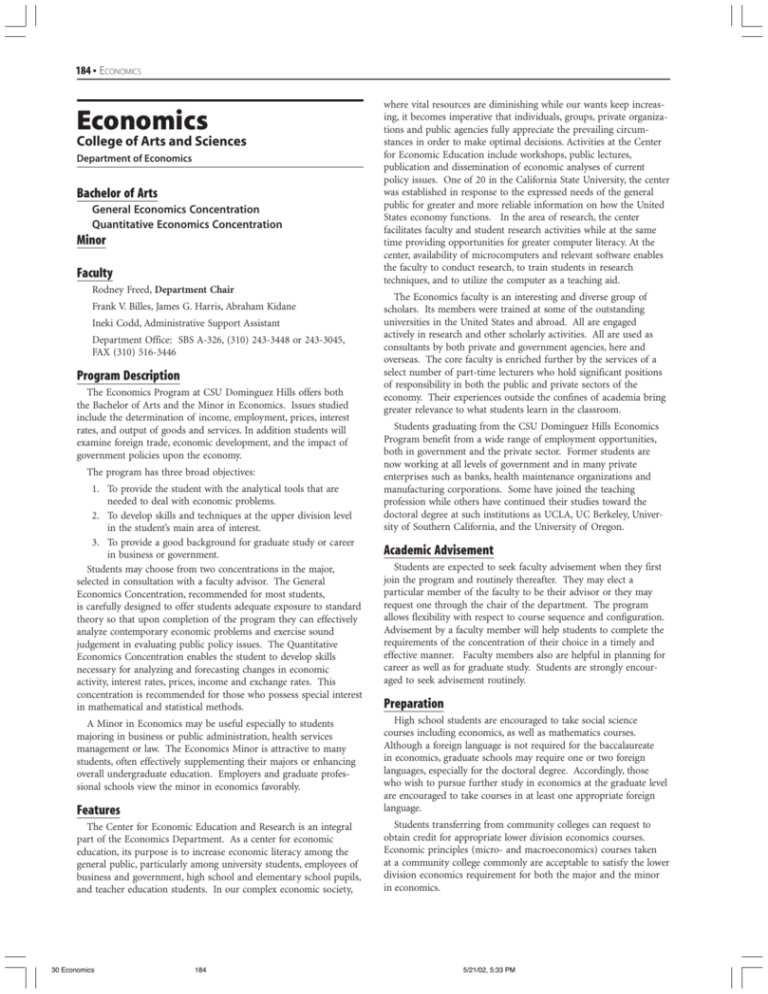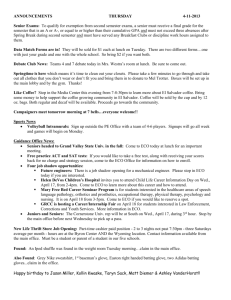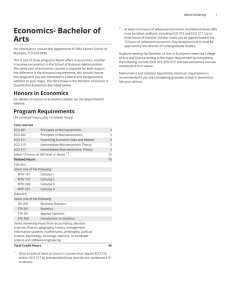Economics - California State University, Dominguez Hills
advertisement

184 • ECONOMICS Economics College of Arts and Sciences Department of Economics Bachelor of Arts General Economics Concentration Quantitative Economics Concentration Minor Faculty Rodney Freed, Department Chair Frank V. Billes, James G. Harris, Abraham Kidane Ineki Codd, Administrative Support Assistant Department Office: SBS A-326, (310) 243-3448 or 243-3045, FAX (310) 516-3446 Program Description The Economics Program at CSU Dominguez Hills offers both the Bachelor of Arts and the Minor in Economics. Issues studied include the determination of income, employment, prices, interest rates, and output of goods and services. In addition students will examine foreign trade, economic development, and the impact of government policies upon the economy. The program has three broad objectives: 1. To provide the student with the analytical tools that are needed to deal with economic problems. 2. To develop skills and techniques at the upper division level in the student’s main area of interest. 3. To provide a good background for graduate study or career in business or government. Students may choose from two concentrations in the major, selected in consultation with a faculty advisor. The General Economics Concentration, recommended for most students, is carefully designed to offer students adequate exposure to standard theory so that upon completion of the program they can effectively analyze contemporary economic problems and exercise sound judgement in evaluating public policy issues. The Quantitative Economics Concentration enables the student to develop skills necessary for analyzing and forecasting changes in economic activity, interest rates, prices, income and exchange rates. This concentration is recommended for those who possess special interest in mathematical and statistical methods. where vital resources are diminishing while our wants keep increasing, it becomes imperative that individuals, groups, private organizations and public agencies fully appreciate the prevailing circumstances in order to make optimal decisions. Activities at the Center for Economic Education include workshops, public lectures, publication and dissemination of economic analyses of current policy issues. One of 20 in the California State University, the center was established in response to the expressed needs of the general public for greater and more reliable information on how the United States economy functions. In the area of research, the center facilitates faculty and student research activities while at the same time providing opportunities for greater computer literacy. At the center, availability of microcomputers and relevant software enables the faculty to conduct research, to train students in research techniques, and to utilize the computer as a teaching aid. The Economics faculty is an interesting and diverse group of scholars. Its members were trained at some of the outstanding universities in the United States and abroad. All are engaged actively in research and other scholarly activities. All are used as consultants by both private and government agencies, here and overseas. The core faculty is enriched further by the services of a select number of part-time lecturers who hold significant positions of responsibility in both the public and private sectors of the economy. Their experiences outside the confines of academia bring greater relevance to what students learn in the classroom. Students graduating from the CSU Dominguez Hills Economics Program benefit from a wide range of employment opportunities, both in government and the private sector. Former students are now working at all levels of government and in many private enterprises such as banks, health maintenance organizations and manufacturing corporations. Some have joined the teaching profession while others have continued their studies toward the doctoral degree at such institutions as UCLA, UC Berkeley, University of Southern California, and the University of Oregon. Academic Advisement Students are expected to seek faculty advisement when they first join the program and routinely thereafter. They may elect a particular member of the faculty to be their advisor or they may request one through the chair of the department. The program allows flexibility with respect to course sequence and configuration. Advisement by a faculty member will help students to complete the requirements of the concentration of their choice in a timely and effective manner. Faculty members also are helpful in planning for career as well as for graduate study. Students are strongly encouraged to seek advisement routinely. Preparation Features High school students are encouraged to take social science courses including economics, as well as mathematics courses. Although a foreign language is not required for the baccalaureate in economics, graduate schools may require one or two foreign languages, especially for the doctoral degree. Accordingly, those who wish to pursue further study in economics at the graduate level are encouraged to take courses in at least one appropriate foreign language. The Center for Economic Education and Research is an integral part of the Economics Department. As a center for economic education, its purpose is to increase economic literacy among the general public, particularly among university students, employees of business and government, high school and elementary school pupils, and teacher education students. In our complex economic society, Students transferring from community colleges can request to obtain credit for appropriate lower division economics courses. Economic principles (micro- and macroeconomics) courses taken at a community college commonly are acceptable to satisfy the lower division economics requirement for both the major and the minor in economics. A Minor in Economics may be useful especially to students majoring in business or public administration, health services management or law. The Economics Minor is attractive to many students, often effectively supplementing their majors or enhancing overall undergraduate education. Employers and graduate professional schools view the minor in economics favorably. 30 Economics 184 5/21/02, 5:33 PM ECONOMICS • 185 Graduation with Honors General Economics Concentration (36 units) An undergraduate student may be a candidate for graduation with Honors in Economics provided the student meets the following criteria: A. Common Core Requirements (18 units) B. Lower Division Required Courses (3 units) 1. A minimum of 36 units in residence at CSU Dominguez Hills; 2. A minimum GPA of at least 3.5 in all courses used to satisfy the upper-division requirements in the major; 3. Recommendation by the faculty of the Economics Department. Bachelor of Arts in Economics Total Course Requirements for the Bachelor's Degree See the "Requirements for the Bachelor's Degree" in the University Catalog for complete details on general degree requirements. A minimum of 40 units, including those required for the major, must be upper division. Elective Requirements Completion of elective courses (beyond the requirements listed below) to reach a total of a minimum of 120 units. Financial Accounting (3) or Calculus I (3) ACC 230. MAT 191. C. Upper Division Requirements (15 units) 1. Select three courses from the following (9 units): ECO 322. ECO 327. ECO 330. ECO 340. ECO 341. ECO 345. 2. Select two additional upper division courses in Economics (6 units). Quantitative Economics Concentration (40 units) A. Common Core Requirements (18 units) B. Lower Division Required Courses (7 units) CIS 270. Introduction to Computers & Data Processing (3) or Introduction to Computers and Basic Programming I (3) Survey of Calculus for Management and Life Sciences I (4) CSC 111. General Education Requirements (54-60 units) See the "General Education" requirements in the University Catalog or the Class Schedule for the most current information on General Education requirements and course offerings. United States History, Constitution and American Ideals Requirement (6 units) See the "United States History, Constitution, and American Ideals" requirements in the University Catalog. Courses used to satisfy this requirement do not apply to General Education . Graduation Writing Assessment Requirement See the "Graduation Writing Assessment Requirement" in the University Catalog. Minor Requirements Student completing this major will need to complete a minor in another field. Money and Banking (3) Public Finance (3) Labor Economics (3) International Trade Theory (3) International Finance (3) Economic Development (3) MAT 171. C. Upper Division Requirements (15 units) 1. Required Course (3 units) ECO 351. Introduction to Econometrics (3) 2. Select two courses from the following (6 units): ECO 322. ECO 327. ECO 330. ECO 340. ECO 341. ECO 345. Money and Banking (3) Public Finance (3) Labor Economics (3) International Trade Theory (3) International Finance (3) Economic Development (3) 3. Select two additional upper division courses in Economics (6 units). Major Requirements (36-40 units) Students must select one of the concentrations listed. The following courses, or their approved transfer equivalents, are required of all candidates for this degree. Common Core Requirements (18 units) A. Lower Division Required Courses (9 units) ECO 210. ECO 211. ECO 230. Economic Theory 1A (Microeconomics) (3) Economic Theory 1B (Macroeconomics) (3) Statistics for Economists (3) B. Upper Division Required Courses (9 units) ECO 310. ECO 311. ECO 350. Intermediate Microeconomic Theory (3) Intermediate Macroeconomic Theory (3) Quantitative Economic Analysis (3) Each student must select one of the concentrations listed below. 30 Economics 185 Minor in Economics (18 units) A. Lower Division Requirements (6 units) ECO 210. ECO 211. Economic Theory 1A (Microeconomics) (3) Economic Theory 1B (Macroeconomics) (3) B. Upper Division Requirements (12 units) 1. Required Courses (6 units) ECO 310. ECO 311. Intermediate Microeconomic Theory (3) Intermediate Macroeconomic Theory (3) 2. Select one course from the following (3 units): ECO 322. ECO 327. ECO 340. ECO 341. ECO 345. Money and Banking (3) Public Finance (3) International Trade Theory (3) International Finance (3) Economic Development (3) 5/21/02, 5:33 PM 186 • ECONOMICS 3. Select one course from the following (3 units): ECO 315. ECO 330. ECO 350. American Economic History (3) Labor Economics (3) Quantitative Economic Analysis (3) ECO 351. ECO 375. Introduction to Econometrics (3) Industrial Organization and the American Economy (3) [I] The Economics of Urban Areas (3) Economics of Health (3) [I] ECO 380. ECO 384. [I] = course is infrequently offered Course Offerings The credit value for each course in semester units is indicated for each term by a number in parentheses following the title. Departments may indicate the term in which they expect to offer the course by the use of: “F” (fall), “S” (spring) or “EOY” (every other year). Lower Division ECO 200 Contemporary Economic Issues and Problems (3) FS. An examination of contemporary economic institutions, issues, and problems as they affect various groups in our society. Familiarization with basic analytical tools and techniques necessary for studying current issues. ECO 210 Economic Theory 1A Microeconomics (3) FS. Introductory microeconomic theory; resource allocation, output determination; production theory, income distribution. ECO 211 Economic Theory 1B Macroeconomics (3) FS. Introductory macroeconomic theory; national income accounting, national income determination, monetary and fiscal policy. ECO 230 Statistics for Economics (3) S. Prerequisite: MAT 009 or fulfillment of ELM requirement. Introduction to probability theory, estimation of population proportions, means, variances, hypothesis tests, statistical inference and decision-making using multivariate analysis, basic regression analysis, and Bayesean techniques; computer assisted workshops/studies. Upper Division ECO 310 Intermediate Microeconomic Theory (3) FS. Prerequisite: ECO 210. Role of prices in product and factor markets, principles of production and costs, business behavior under various types of market structure, general equilibrium and welfare economics. ECO 311 Intermediate Macroeconomic Theory (3) FS. Prerequisite: ECO 211. Measurements and analysis of the determinants of national income, employment and the general price level. Theoretical foundations of contemporary monetary and fiscal policies. 30 Economics 186 ECO 315 American Economic History (3) F. Development of the American economy, organizational patterns and institutions, from settlement to the present, with emphasis on the interaction of social, political, and economic phenomena. ECO 350 Quantitative Economic Analysis (3) F. Prerequisites: ECO 210 and ECO 310. ECO 322 Money and Banking (3) S. Prerequisites: ECO 210 and ECO 211. Nature and functions of money and its relation to prices; the monetary system of the United States; the functions of banks, bank-credit, foreign exchange and monetary control. ECO 327 Public Finance (3) F. Prerequisites: ECO 210 and ECO 211. Economic principles underlying public administration. Concepts of socially efficient resource allocation and provision of public goods. Emphasis on fiscal functions of federal, state and local governments, the allocation of resources between government and private use. Prerequisite: ECO 210 or consent of instructor. Analysis of supply and demand for labor, wage determination, investment in human capital, minimum wage laws and the economics of collective bargaining. Taught with either general focus or special focus; e.g., women, disadvantaged groups and unions. ECO 341 International Finance (3) S. Prerequisites: ECO 210 and ECO 211. Analysis of international financial transactions, capital movements, international financial organizations, balance of payments, key currencies and exchange rates. Comparison of alternative international monetary systems. ECO 345 Economic Development (3) S. Prerequisites: ECO 210 and ECO 211. Theories of economic development. Contemporary economic structure of low income countries. Causes of limited economic growth. Policy alternatives. Prerequisites: MAT 009 and ECO 230. Application of statistical techniques to the problem of testing the validity of behavioral relationships suggested by economic theory. Topics include regression analysis, time series models, forecasting, and decision making. Applications performed on the computer. Two hours of lecture and two hours of technical activity. ECO 494 Independent Study (2-3) FS. Prerequisites: ECO 210 and ECO 211, and consent of instructor are recommended. ECO 340 International Trade Theory (3) F. Classical and modern theories of international trade, theory and practice of protection, commercial policies, balance of payment adjustments and regional trade organizations. ECO 351 Introduction to Econometrics (3) S. ECO 380 The Economics of Urban Areas (3) EOY. Economic factors underlying and following from the urbanization of modern societies. Current problems such as urban decay, air and water pollution, transportation construction, education, racial concentration, and city-state and city-federal relationships. ECO 330 Labor Economics (3) F. Prerequisites: ECO 210 and ECO 211. Construction and application of mathematical models to economic and business decision-making. Modeling techniques including the Lagrange multiplier technique, optimal control theory, and differential game theory. Two hours of lecture and two hours of technical activity. Individual study of some topic or problem under the supervision of a member of the Economics Department. Repeatable course. ECO 495 Special Topics in Economics (3). A course focusing on selected topics in economics, such as economics of inflation, health, education, ecology, oil spills, and risk and insurance. Repeatable course. Infrequently Offered Courses The following courses are scheduled on a "demand" basis. Students should consult the department office for information about the next schedule offering. ECO 375 Industrial Organization and the American Economy (3) S. Prerequisites: ECO 210 and ECO 211. Current issues of industrial organization, concentration, and diversification. Anti-trust policy. ECO 384 Economics of Health (3) EOY. Prerequisite: ECO 210 or consent of instructor. Deals with topics such as supply and demand for health services, prices and cost of health care, fiscal resources and allocations, health insurance and methods of reimbursement, and influences of Medicaid and Medicare and health care consumption and delivery. 5/21/02, 5:33 PM





